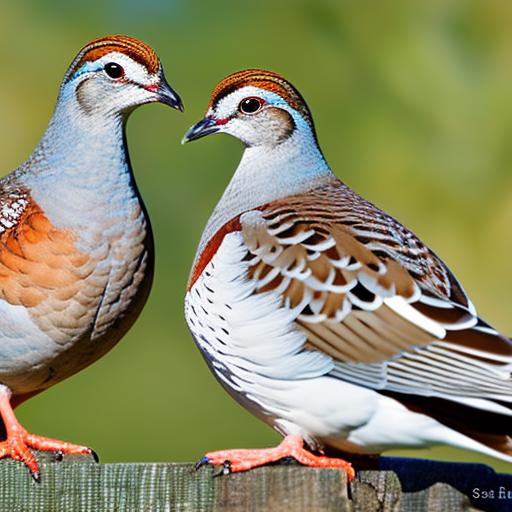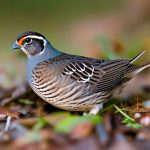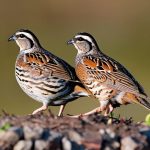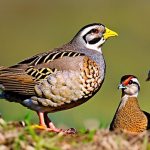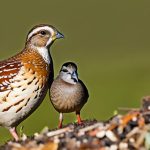Keeping quail and doves together can be a rewarding experience for bird enthusiasts. Both quail and doves are small, ground-dwelling birds that can coexist in the same aviary or outdoor enclosure. Quail are known for their small size, colorful plumage, and social nature, while doves are recognized for their gentle demeanor and soothing cooing sounds. By understanding the compatibility, living conditions, feeding and nutrition, social dynamics, and health considerations for both quail and doves, bird keepers can create a harmonious environment for these avian species to thrive together.
Quail and doves have different characteristics and behaviors, but with proper care and attention, they can cohabitate peacefully. It’s important to provide suitable living conditions, manage social dynamics, and ensure proper nutrition and health care for both species. By considering these factors, bird keepers can create a balanced and enriching environment for quail and doves to live together harmoniously.
Key Takeaways
- Quail and doves can be kept together in the same aviary or coop, but it requires careful consideration and planning.
- Understanding the natural behaviors and social dynamics of quail and doves is crucial for ensuring compatibility in a shared living space.
- Providing suitable living conditions for both quail and doves involves creating separate areas for nesting, roosting, and dust bathing.
- A balanced diet that meets the specific nutritional needs of quail and doves is essential for their health and well-being.
- Managing social dynamics between quail and doves may involve providing hiding spots and ensuring enough space to prevent overcrowding and aggression.
Understanding the Compatibility of Quail and Doves
Quail and doves are generally compatible birds that can coexist in the same living space with proper planning and care. Quail are known for their social nature and tend to thrive in small flocks, while doves are gentle birds that prefer to live in pairs or small groups. When introducing quail and doves to the same enclosure, it’s important to consider the space requirements, nesting areas, and potential conflicts that may arise.
Quail and doves have different space requirements, with quail needing more ground space to forage and dust bathe, while doves require elevated perches for roosting and nesting. Providing multiple levels within the enclosure can help accommodate the different needs of both species. Additionally, creating separate nesting areas for each species can help minimize competition and potential conflicts. By understanding the compatibility of quail and doves, bird keepers can create a harmonious living environment that meets the needs of both species.
Providing Suitable Living Conditions for Quail and Doves
Creating suitable living conditions for quail and doves involves providing adequate space, shelter, nesting areas, and environmental enrichment. Quail are ground-dwelling birds that require a substrate for dust bathing and foraging, while doves prefer elevated perches for roosting and nesting. When designing the living space for quail and doves, it’s important to consider their natural behaviors and provide opportunities for them to engage in these activities.
In addition to space considerations, providing shelter from the elements is essential for both quail and doves. This can include natural vegetation, artificial shelters, or enclosed areas within the enclosure. Nesting areas should also be provided to accommodate the different nesting preferences of quail and doves. Quail prefer to nest on the ground in concealed areas, while doves prefer elevated nesting sites. By providing suitable living conditions that meet the needs of both species, bird keepers can create a comfortable and enriching environment for quail and doves to thrive together.
Feeding and Nutrition for Quail and Doves
Feeding and nutrition play a crucial role in maintaining the health and well-being of quail and doves. Both species have specific dietary requirements that need to be met in order to ensure optimal health. Quail are omnivorous birds that require a diet rich in protein, such as insects, seeds, and commercial game bird feed. Doves, on the other hand, are primarily seed-eating birds that require a diet high in grains and seeds.
When keeping quail and doves together, it’s important to provide a balanced diet that meets the nutritional needs of both species. This can include offering a combination of game bird feed, seeds, grains, and fresh fruits and vegetables. Additionally, providing access to grit or small stones can help aid in digestion for both quail and doves. By understanding the feeding and nutritional requirements of quail and doves, bird keepers can ensure that both species receive the necessary nutrients to support their overall health and well-being.
Managing Social Dynamics between Quail and Doves
Managing social dynamics between quail and doves involves understanding their natural behaviors, social structures, and potential conflicts that may arise. Quail are social birds that thrive in small flocks, while doves are known for forming monogamous pairs or small groups. When introducing quail and doves to the same living space, it’s important to monitor their interactions and provide opportunities for them to establish their own territories and hierarchies.
Quail and doves may exhibit territorial behaviors, especially during breeding seasons or when nesting. Providing multiple feeding stations, perches, and nesting areas can help minimize competition and potential conflicts between quail and doves. Additionally, observing their interactions on a regular basis can help bird keepers identify any signs of aggression or stress and take appropriate measures to address these issues. By managing social dynamics between quail and doves, bird keepers can create a harmonious living environment that promotes positive interactions between both species.
Health Considerations for Keeping Quail and Doves Together
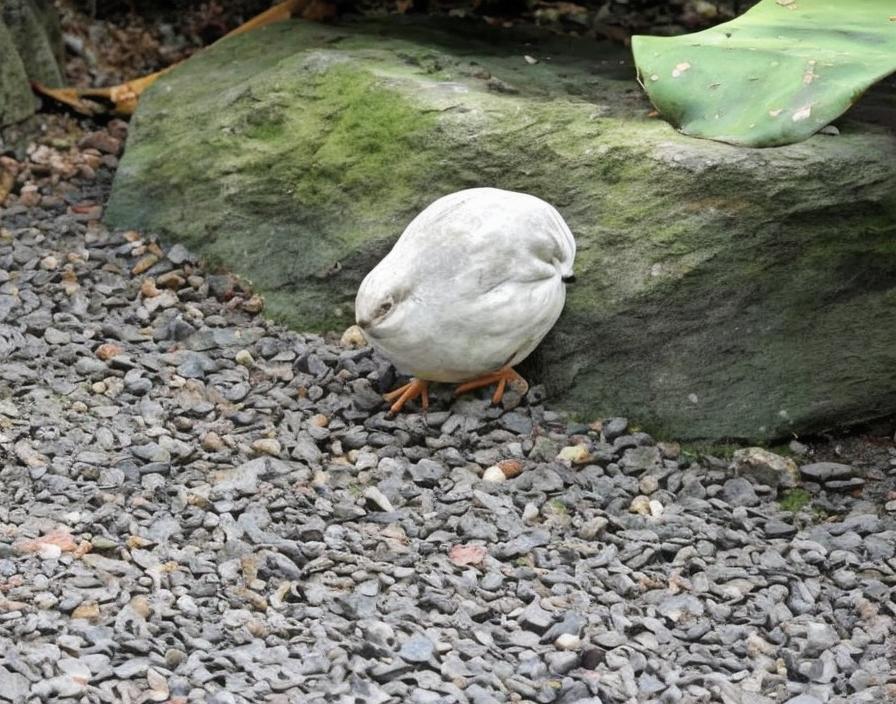
Maintaining the health of quail and doves is essential for their overall well-being when kept together. Both species are susceptible to various health issues, including respiratory infections, parasites, nutritional deficiencies, and injuries. It’s important for bird keepers to monitor the health of quail and doves on a regular basis and provide appropriate care when needed.
Regular health checks, observation of behavior, and maintaining a clean living environment are important aspects of keeping quail and doves healthy. Providing access to clean water, proper nutrition, and opportunities for exercise can help support their immune systems and overall health. Additionally, seeking veterinary care from a professional with avian experience is crucial if any health concerns arise. By prioritizing the health considerations of quail and doves, bird keepers can ensure that both species remain healthy and thriving in their shared living space.
Conclusion and Final Considerations for Keeping Quail and Doves Together
In conclusion, keeping quail and doves together can be a rewarding experience when done with careful consideration of their compatibility, living conditions, feeding and nutrition, social dynamics, and health considerations. By understanding the natural behaviors and requirements of both species, bird keepers can create a harmonious environment that meets the needs of quail and doves.
Providing suitable living conditions that accommodate the different space requirements, shelter, nesting areas, feeding stations, perches, and environmental enrichment is essential for creating a balanced living space for quail and doves. Additionally, managing social dynamics by observing their interactions, providing opportunities for establishing territories, and addressing potential conflicts is important for promoting positive interactions between both species.
Finally, prioritizing the health considerations of quail and doves by monitoring their health on a regular basis, providing proper nutrition, maintaining a clean living environment, and seeking veterinary care when needed is crucial for ensuring their overall well-being. By considering these final considerations for keeping quail and doves together, bird keepers can create a harmonious environment where both species can thrive together in a shared living space.
If you’re considering keeping quail and doves together, it’s important to provide them with a suitable living environment. A large chicken coop can offer ample space for both species to thrive. Check out this article on PoultryWizard for some great ideas on large chicken coop designs here. Creating a spacious and well-designed coop can help ensure the comfort and well-being of your quail and doves as they cohabitate.
FAQs
Can I keep quail with doves together?
Yes, it is possible to keep quail and doves together in the same aviary or enclosure. However, it is important to provide enough space and appropriate housing to accommodate the different needs of both species.
What should I consider when keeping quail and doves together?
When keeping quail and doves together, it is important to consider the size of the enclosure, the compatibility of the species, and the availability of appropriate food and water sources for both quail and doves.
Do quail and doves have different housing requirements?
Yes, quail and doves have different housing requirements. Quail require ground-level housing with access to dust baths, while doves prefer elevated perches and nesting areas. It is important to provide both species with suitable housing to meet their specific needs.
What should I feed quail and doves when kept together?
When kept together, quail and doves can be fed a combination of commercial bird feed, seeds, and grains. It is important to ensure that both species have access to appropriate food sources to meet their nutritional needs.
Are there any potential conflicts between quail and doves when kept together?
There may be potential conflicts between quail and doves when kept together, especially during breeding seasons. It is important to monitor the behavior of both species and provide enough space and hiding spots to minimize potential conflicts.
Meet Walter, the feathered-friend fanatic of Florida! Nestled in the sunshine state, Walter struts through life with his feathered companions, clucking his way to happiness. With a coop that’s fancier than a five-star hotel, he’s the Don Juan of the chicken world. When he’s not teaching his hens to do the cha-cha, you’ll find him in a heated debate with his prized rooster, Sir Clucks-a-Lot. Walter’s poultry passion is no yolk; he’s the sunny-side-up guy you never knew you needed in your flock of friends!

